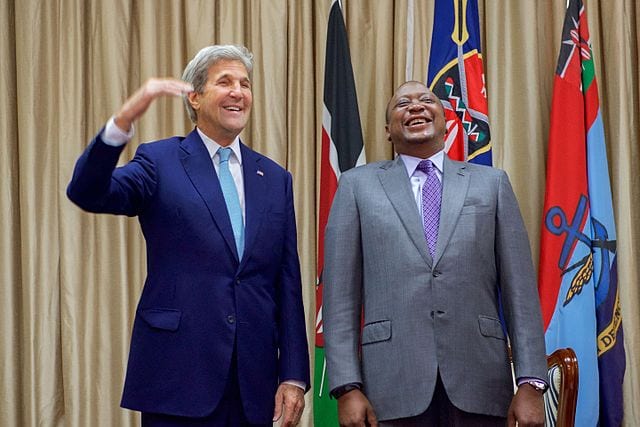
Derision is a complicated thing. At its most sophomoric, derision is little more than blowing raspberries on the playground – good for a laugh at someone’s expense but without much of a point. When given proper thought and execution, though, derision can deliver persuasive satire or charming self-deprecation, both of which bond audience and humorist closer together.
While diplomats use humor regularly to engage foreign audiences, often with successful results, there is little study of its use as a public diplomacy tool. Unfortunately, there is no formal understanding of the strategic use of humor when engaging foreign audiences. As a result, we see some nightmares when humor is poorly applied. When a diplomat’s joke bombs, the risk of real bombs is greater than when a new stand-up chokes at Comedy Works. It’s like Bono pleading with the UN to send a CVE-comedy task-force to Syria – we seem to know that there’s something there, but we just can’t quite grasp how to harness it.
Let’s talk about the failures of derision in public diplomacy. The most glaring example is “Think Again, Turn Away,” a counter-terrorism effort so poorly conceived that even our own comedians mocked it. In 2013, the Global Engagement Center from the U.S. Department of State launched the video “Think Again, Turn Away” on YouTube, intending to reach the same young audience that ISIS targeted online for recruitment. It wasn’t long before people realized that the snark-filled, sardonic PSA was utterly tone-deaf.
[youtube https://www.youtube.com/watch?v=o3VDDbh5dXw&w=560&h=315]
The team that produced “Think Again, Turn Away” undoubtedly understands the situation in ISIS-occupied territories better than most. They just don’t know comedy.
For every joke, there is an in-group and an out-group. These groups may be defined as those who get the joke and those who don’t, or along the classic laughing with/laughing at split. Derision especially lends itself to this split, more so than other comedic styles. Creating distinct in-groups and out-groups can reinforce or undermine existing narratives, depending on how those groups are framed.
Think of it this way: Everyone has a story in their head that tells them who they are. That’s our identity narrative. We have stories about our place in that world. We call those system narratives. In every narrative, there is a protagonist (the in-group) and an antagonist (the out-group). Generally, people like to be the protagonists of their own stories. We make this happen by aligning our identity narratives and system narratives in such a way that we belong to the in-group throughout. So, if we hear a different narrative, perhaps in the form of a joke, that recasts us as members of the out-group, we will reject that narrative. Not only that, we’ll likely cast whoever shared that narrative as a member of the out-group in our own narratives.
Here is a narrative map for a typical ISIS recruit, based on research on ISIS target messaging:
| Identity Narrative | System Narrative | |
| ISIS Recruit | Young, over-educated & underemployed, an outsider (perceived or actual) of mainstream society, destined to and/or worthy of greatness | Living in a society that is hostile towards identity, unjust, limited opportunities to advance; the West is keeping true believers down, only the caliphate is righteous |
“Think Again, Turn Away” tries to undermine the “righteous caliphate” narrative by using sarcasm to cast ISIS in the out-group. However, the video fails to draw the potential recruits into its in-group. Therefore, it’s mockery only reinforces the theme of separation between recruits and the West present in both narrative levels.
So, if we hear a different narrative, perhaps in the form of a joke, that recasts us as members of the out-group, we will reject that narrative. Not only that, we’ll likely cast whoever shared that narrative as a member of the out-group in our own narratives.
Understanding the dynamics of in-groups and out-groups isn’t just good comedy – it’s good communication. Philip Seib says that successful communication is always audience based and ties into the narratives of that audience’s socio-political context. Obviously, “Think Again, Turn Away” is not audience based. Rather than embrace its target audience, clearly marking themselves as being “on the same team,” or both part of the in-group, the narrator mocks the ideological society that said audience expressed interest in joining. That is why the video targets its specified audience, after all. By mocking the group with which the audience has already identified, even superficially, it casts both in the out-group, cementing the audience’s allegiance to the butt of the joke.
One might have done less damage trying to sincerely persuade potential recruits to join ISIS. John Oliver points out that the State Department is “banking a lot on any potential militants understanding that [“Think Again, Turn Away”] is sarcasm,” the implication being that the intended audience won’t get the joke. Alternatively, the audience might understand the joke, but doesn’t find it the least bit funny. Either way, the video reinforces extremist messaging by squarely casting the audience in the out-group.
Whether or not potential recruits have the capacity or inclination to “appreciate” the video’s try at sarcasm, humans respond to humor cognitively and emotionally. No one likes being mocked; it makes us feel bad. You learned this blowing raspberries on the playground. When the audience you are trying to reach is also the butt of your joke, you have missed the point.
The views expressed here are the author’s only and do no necessarily represent those of George Washington University.


1 thought on “When Public Diplomacy Is a Bad Joke: The importance of in-groups and out-groups to the successful use of humor by diplomats”